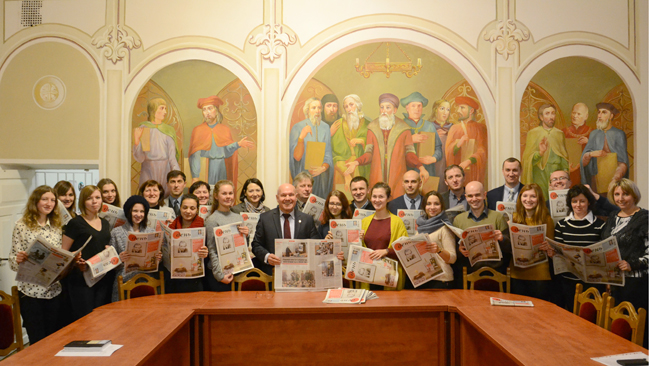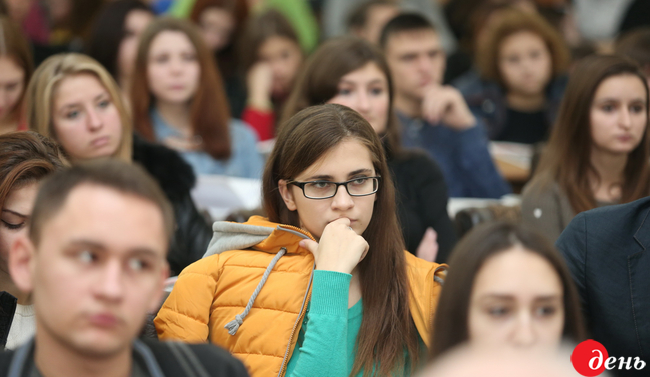“Read. Think. Act!”
2016 is the Year of the Readers of Den/The Day
“Russia reads Izvestia, America – The New York Times, and Ukraine – Den.” Back in 1996 this motto outlined the plans of the publication and level (of understanding of processes) with which the newspaper entered the world media environment. For 20 years Den has been following the social processes, not just mirroring them, but somewhere laying the path for new ideas, and even generating new ones. The society was changing, the generations and circles of the readers of Den were changing, and the nationwide newspaper and its accents were changing too. The story of the newspaper over this time is the history of the readiness to show its position and stick to its principles.
Since then the Russian Izvestia has entered a different paradigm of journalist standards and values. The publication of the book Journalism is over. Forget about It. About Colleagues, the Drama of Izvestia, and the Collapse of the Profession proved this back in 2007. And the world-famous publication The New York Times showed that there are many skeletons in the closets of Western journalism too. Den/The Day has a story connected with this newspaper. In his time journalist of The New York Times Walter Duranty who denied the Holodomor in Ukraine received the Pulitzer Prize for highlighting Stalin’s first five-year plan. The Pulitzer Committee and the editorial office of The New York Times didn’t reply to the letter sent by Den/The Day’s editor-in-chief Larysa Ivshyna and our contributor James Mace concerning the withdrawal of the prize.
Den/The Day has always stuck to its principles and continued to win audience. We can ascertain the fact that not entire Ukraine became the territory of mass readership of Den/The Day. But there have been serious reasons for this and they need social reconsidering. At the same time, much bigger forces, powerful media holdings, often supported by the government, were working for degradation of the population, making it plunge into the darkness.
The following year after the motto about readership, a deeper version appeared: “The newspaper Den is for people who are not lazy to think!” It is not enough to read. We can see this especially now, when the mass media providing verified information, the mass media Ukrainians can trust in their country (a rare thing, as it has turned out over 20 years) are valued the most. One day, having stopped to analyze what they read, people understood that they found themselves, conditionally speaking, at a “Ukrainian information dumpster.” An urgent problem arose with understanding of what was going on in the country, and apparently few people could give answer to this question. The processes of the previous years had their reasons and “tails,” but few people could follow them, surrounded by the wall of silence of the mass media. However, Den became for its readers a certain area of intellect, where you could, like in an observatory, carefully follow the flow of modern history and study the unknown pages of the events of the past. So, it is quite logical that the readers offered to announce 2016 year, which marks the 20th anniversary of the newspaper, the Year of the Newspaper Den. And the editorial staff, in response, offered to announce it the Year of Den’s Readers.
It is the year of all those who read our newspaper, visit our website, know the Library of the newspaper, take part in our numerous projects, which past year were brightly represented at Den’s Tree of Achievements. Our readership is building a qualitatively new view on high-quality journalism, together with us.
“I think that the topic of the 2016 year should be the very important anniversary in the history of Ukrainian journalism and Ukraine on the whole,” says writer and publicist Yurii Shcherbak. “This is the 20th anniversary of the newspaper Den, a newspaper that is a mirror of Ukrainian history, which will be used by historians in the future to study the events that took place in Ukraine at the most important moments of our history. Den has always had a standpoint of its own when it was highlighting the crucial events, so in terms of these events we can speak about the 20th anniversary of the publication. The newspaper is worth of it. It is done not for the sake of praise, but in order to remind which role was played by Den in learning our history, understanding complicated dramatic events of recent time, when Ukraine was practically facing a serious choice. Let’s take the story of Russian aggression in Tuzla and the way Den highlighted it. Den didn’t ignore the events of home and foreign policy, and the readers were ardently discussing them. I recall the wonderful column ‘Mail of Den’ which has been publishing the letters of the readers about the newspaper’s articles. Den has always been in the center of the discussion and set the tone of the debate.”
But if Den became the center of discussion, and ideological platform for those who wanted to read cleverly and project the ideas of their own, where was the area of Den’s readership? Looking at the audiences gathered by the meetings with Den/The Day’s editor-in-chief Larysa Ivshyna, we can say – it was at the universities. We have seen our first allies there and consistently worked on the broadening of this intellectual environment. Den/The Day feels prospects where our ideas take root and grow. So, Den/The Day is not just read at the Ostroh Academy. This year a fourth-year student Ruslana Marynych is writing a bachelor thesis with the topic “Peculiarities of highlighting the Ostroh history in Petro Kraliuk’s articles published in the newspaper Den.” And the conversation Larysa Ivshyna had recently with the students of the academy not only evoked a heated discussion, but also made the Ostroh students offer the following topic of a research paper for the next university year for the students of journalism – “The humanitarian policy of the newspaper Den over the 20 years of its activity and the platforms of other remarkable Ukrainian media: comparison.” Moreover, the rector of the academy Ihor Pasichnyk said that “Ostroh is not only the territory of reading Den, but also teaching Den. A special course ‘Den as a convergent medium’ will be offered for the students of the academy.”

We have other examples. At Chernivtsi National University students have recently defended the master’s papers dedicated to publicist works by Klara Gudzyk and Serhii Krymsky in Den, whereas a course paper on publicist works by James Mace is being currently written. The activity of Den at the university is taught as an example of journalism mastery at the courses “Newspaper-Journal Genres,” “Theory of Opinion-Journalism.” In Kamianets-Podilsky a student is writing a bachelor’s paper on “Education and Culture Studies Discourse of the nationwide newspaper Den;” the mentor is Natalia Zahoruiko. In Zaporizhia for 10 years now the students have been involved in quality journalism within the framework of a special course based on the materials of Den.
“The student, except for the teacher, needs various sources of information – books, study guides. So, the newspaper Den is a textbook, a study guide, and a visual aid,” says deputy dean of the journalism department of the Zaporizhia National University Viktor KOSTIUK, “That is why together with the students, starting with the first year, we keep direct contact with the newspaper through learning its articles to book projects and the history of the periodical. For me this is involvement of students in quality journalism. Ivshyna came to our department for the first time in 2005, after this she inspired me with the idea, I got support at the faculty which was newly created, and we founded a special course based on the books of the newspaper Den. Namely owing to the book Two Rus’s published by Den, reading Lina Kostenko’s article “Ukraine as a victim and a factor of globalization catastrophe,” I opened for myself the topic of Chornobyl journalism. So, based on the ideas inspired by Den, another special course emerged, ‘Chornobyl Journalism.’ At the introduction to the profession everyone reads James Mace’s work ‘A Tale of Two Journalists.’ During the first year of studies, when we study the freedom of speech and journalist activity, we speak about the international legislation in the sphere of media, we dedicate two classes to the business game ‘A European Court case: Ukrainian Press Group vs. Ukraine.’ It helps to understand certain moments much better: that there is a law to protect the journalist, and the newspapers which defended their right found the truth as far as in the European Court.”
Ostroh, Zaporizhia, Lviv, and Kyiv have proved that the young audience has a demand for quality content. Is there a proposal on the level of universities?
To make some measurements, Den/The Day announces a kind of a flash mob. Where the majority of our readers live? Where the majority of our subscribers live? Where do the students write research papers based on the analysis of the newspaper? Where do people have the deepest knowledge of the publication? Where is the highest index of citing the materials of the newspaper? Which places have clubs for discussion of the most important articles and books from Den/The Day’s Library? How do the teachers broaden the “intellectual environment” based on the newspaper? All these things, in the context of the analysis of the newspaper’s interaction with the society for all these 20 years, Den will survey independently, but also it offers for the university to show the initiative themselves and make their stand known. That is how we will define Den’s Favorite.
The 20th anniversary is an important time to make some intermediate conclusions, to define the points of response in the society, to understand which environments are ready for intellectual interaction with Den and who is moving in the same direction. Movement is extremely important today. “Read. Think. Act!” was the motto of Den back in 2012. If we want changes, it is not enough only to read and think about them. You need to move to a new stage.
IMPRESSIONS
Anna PAVLENKO, student, Ostroh Academy, journalism speciality:
“Larysa Ivshyna speaks about the problems which have long ago become popular in our society. But no one notices them for some reason. Or simply doesn’t want to notice. She is right: our society is neglected. So, we need ambition and national awareness. We lack ideology. But on her example we can see that we can fight. For our whole life we have been fed from information dumpsters. But now it is time to rethink what mass media offer to us and look at them with the eyes of an aware, intellectually shaped personality. To analyze them from the viewpoint of a full-fledged citizen of our state.”
Yevhen MALCHYK, student, Ostroh Academy, Faculty of Humanities:
“I totally agree with the affirmation of our social problems mentioned by Larysa Ivshyna. We need to reconsider our actions and understand that our future depends on each one of us. So, we shouldn’t observe Ukraine from aside. We need to read more high-quality press, with Den/The Day topping the list, analyze and discuss Before changing something on a global scale we need first to reorient ourselves to avoid making the mistakes emphasized by Larysa Ivshyna during her talk with the students of the Ostroh Academy.”
Newspaper output №:
№73, (2015)Section
Society





